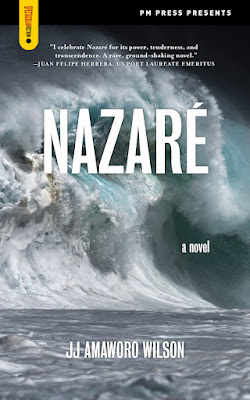“Nazaré” by J.J. Amaworo Wilson, 2021
This
is a novel about a magical realist revolution in the Village With No Name and a
land called Balaal that is perhaps in South America, but is really the whole
global south. An international stew of polyglot languages,
peoples, words, places, animals and things reflect a desperate area angry at
the bloody and repressive Matanza family – matanza meaning ‘slaughter’ in
Spanish.
Words,
Words
Word
are important in this book. Nazaré is a
city in Portugal known for the biggest surfing waves in the world. A large ocean wave named Nazaré saves the lead
character, a boy named Kin, when he is trapped on a small island by thugs who
are drowned. Kin should remind one of
the phrase ‘kith and kin’ – perhaps a relative.
The
dictator’s full name is Porfirio Fulgencio
Melgarejo Trujillo Matanza, which brings up Porfirio Diaz, the former
dictator of Mexico before the Mexican revolution; Fulgencio Batista, the former
dictator of Cuba before Castro and Che; Mariano Melgarejo, a former dictator of
Bolivia who was also overthrown; Rafael Trujillo, the bloody dictator of the
Dominican Republic who died by assassination.
The thugs employed by Matanza are the Tonto Macoute – an obvious reference
to the Tonton Macoutes – a death squad associated with the dictator Jean Claude
Duvalier of Haiti.
Bible
Boy
Biblical
hints abound as well. Balaal should
remind us of Baal – a top Canaanite deity in the Bible, a word that also means
lord or owner. One of the honest fishermen is named Shadrak – harking back to
Shadrach, a friend of Daniel’s who survived an inferno. Nazaré even hints at the town of
Nazareth. An ancient turtle is named
Abacaxi, a Brazilian pineapple but perhaps also riffing off the word ‘abraxas’
–a Gnostic mystical word. Kin goes to
the desert and lives in a cave called Zugarramurdi, which is really a place
where occult witch trials once took place in Spain. He starves for 10 days in the cave, similar
to many occasions in Biblical lore or Hindu practice.
Kin is
not religious, nor are his allies, but muezzin call from towers in Balaal and 3
pigeons are christened ‘The Magi.’ A ‘water walker’ lives in the village. The gold mine is called Bocadelin – the
‘mouth of hell.’ 3 wise men bring gifts
to Kin. Like Lord of the Rings’ Ents
and eagles, nature is also on his side - mostly. The boy will lead the revolution with
the barbudos, the bearded
revolutionaries, and perhaps at some point with more help from Nazaré. Biblical references usually
attempt to give a book gravitas – such is the method of authors like Cormac
McCarthy too.
The
fishermen are Japanese, West Indian, Somali, Guyanese, Indonesian and Pacific
Islanders. The female revolutionary Jesa
(Jesus?) escapes the Tonto Macoute on a camel. The legal system is criminal and arbitrary. The rulers confiscate everything of value
from the people. Prisons are
filled. Homeless boys live on the beach in
shipping containers accidentally dropped off of cargo ships.
To
organize this anarchist revolution, Kin and Jesa recruit desperadoes
from different groups: desert-dwelling
revolutionaries strapped with bullet belts like Zapata; a criminal gang loaded with
explosives led by the King of the Rats, Bashir; ‘travelers’ who bring with them knives and a tiger; a group of stoic
monks skilled in swordplay; giant gold miners led by a man named Cienfuegos,
the name of a leader in the Cuban revolution.
They
are joined by a semi-armed and somewhat ridiculous procession of ragged
civilians, atheistic nuns, suited knights and fishermen from the Village With
No Name, another outcast village and Balaal. They have two ancient cannons, a
fire-breathing metal dragon, a hot-air balloon and tear gas. There is also poison. Unlike the Bolsheviks or the 26th
of July Movement, the groups converge on the central square in Balaal first of
all. These semi-fantastical assemblages
might remind one of the organizations and masses that would need to cohere in
order to have a revolution in the U.S.
This book is a modern form of magical realism, but perhaps more coherent and focused. Magical realism was first developed by Gabriel Garcia Marquez, who used it for somewhat buried political purposes. Now it is usually used as a wing of the apolitical fantasy universe, given the neo-liberal and post-modernist grease on the slides of modern literature. Wilson, however, returns it to its origins.
Does
Matanza’s army of 500 win? Are the Tonto Macoute defeated too? Does nature tip the balance - which rarely
happens in the real world? Do they
succeed in removing the curse of the international Matanza dictatorship? And if they win, what anarchist or magical democratic republic will
replace Matanza? Will nature help or hinder? Will one thug revolutionary, like Bashir the basher, try to gain power for himself? You will have to read
this delightful book…
Prior blog reviews on this subject, use search box, upper left, to investigate our 14 year archive, with these terms: “Damnificados” (Wilson); “Child of God,” “The Road,” “All the Pretty Horses” and “Suttree” (all 4 by McCarthy); “Famished Road” (Okri); “The Dream of the Celt” (Llosa); “Camino Real” (Williams); “The Open Veins of Latin America” (Galeano); “Building the Commune,” “The Diary of Che Guevara,” "Viva Zapata,"“An Anthology of the Writings of Jose Carlos Mariategui.”
The
Kultur Kommissar
November
23, 2021




No comments:
Post a Comment